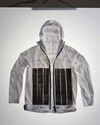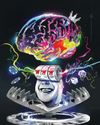
In The Royal Institution's almost 200year history of Christmas Lectures, the topics covered have swept through chemistry, mechanical engineering and astronomy to psychology, climate change and, this year, artificial intelligence (AI).
Many people are concerned about how AI is going to change our healthcare, careers and entertainment, but what do the experts think? Mike Wooldridge is a professor of computer science at the University of Oxford and has been selected to deliver this year's Royal Institute Christmas Lectures on AI.
What was your reaction to being selected to give this year's Royal Institution Christmas Lectures?
I was stunned. The Christmas Lectures were one of the treats over the Christmas period for me as a kid - I was really into science and I can remember watching them in the 1970s.
I remember watching the astrophysicist Carl Sagan talking about the planets and being absolutely entranced by his lectures. More recently we had Sir David Attenborough. David Attenborough!
Following in their footsteps is really quite something. For so many British scientists, the Christmas Lectures were one of the things that kindled their interest in science. To be part of that legacy is amazing.
The Christmas Lectures are famous for their props. What can we expect to see in your talk?
The first thing the RI team told me is that it’s a tradition to have an explosion and a dog (ideally at different times). So there will be an explosion and there will be a dog, but I’m not saying any more than that.
This story is from the December 2023 edition of BBC Science Focus.
Start your 7-day Magzter GOLD free trial to access thousands of curated premium stories, and 9,000+ magazines and newspapers.
Already a subscriber ? Sign In
This story is from the December 2023 edition of BBC Science Focus.
Start your 7-day Magzter GOLD free trial to access thousands of curated premium stories, and 9,000+ magazines and newspapers.
Already a subscriber? Sign In

NOW YOU SEE ME, NOW YOU DON'T
Scientists around the world are working on ways to hide us from sight. But how close are we to developing tech that could make us invisible?

UNCORKED POTENTIAL
How much good can ditching drink for a month really do? Answer: a whole lot. In fact, science shows even short-term abstinence could unlock a cocktail of lasting benefits

Scientists discover when humans and dogs became friends
The relationship spans thousands of years, but experts might have pinpointed the first connection

Why it's so hard to kick a gambling addiction
We now know that gambling can be as addictive as drugs, but there are factors that can make it even harder to quit

How much could Ozempic change our world?
The weight-loss drug has made headlines and broken sales records, but what does it mean for our future?

WHY DOES DRINKING ALCOHOL MAKE IT SO MUCH HARDER TO LOSE WEIGHT?
While enjoying the occasional glass of wine or pint of beer may seem harmless, regular or excessive alcohol consumption can significantly hinder your weight-loss journey for a few reasons:

Why do so many New Year's resolutions fail?
Establishing positive new habits is hard at any time of year. But there are ways to stop your attempts ending in failure

'Extreme' solar radiation storm could hit Earth
Sun-like stars may have tantrums far more frequently than we thought

HOW CAN I BANISH THE JANUARY BLUES?
Dark mornings, long chilly evenings and short days; many people find January tough.

Neutrinos are getting in the way of dark matter detection
These troublesome particles are difficult to detect, but they're starting to show up in places where they're not wanted